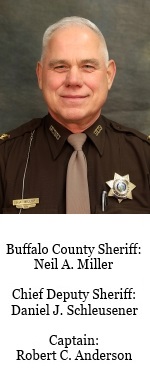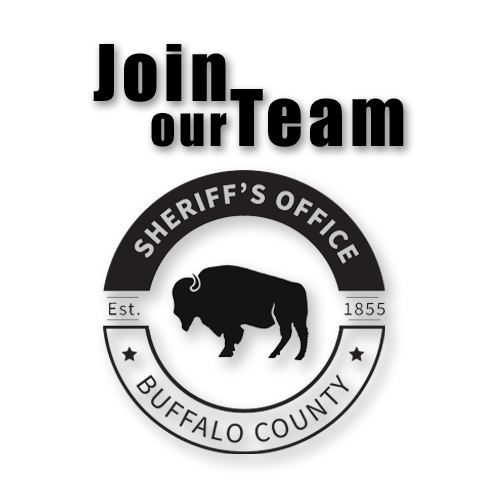Facilities General Information
The Buffalo County Facilities OMP department strives to provide extraordinary, professional and reliable building management services for all of the county facilities. Our Facilities Staff are trained professionals who are committed to providing a clean, safe, secure and functional building environment for both the county staff and the general public. Buffalo County Facilities OMP includes Operations (Custodial and Maintenance), Management (Facility Rental Use and Administrative Services), and Planning (Short term and long term improvements).
The 14 members of the Facilities OMP staff are responsible for maintaining all County Government buildings, including the Courthouse, Judicial Center, County Jail, Highway Department
buildings, Extension Building, 4 office buildings, and a recreation area with a lake and campground. There are over 30 buildings in total. In addition to these facilities, Facilities OMP maintains 11 parking lots, all walkways, steps and lawns adjacent to these areas, including landscaping, and provides snow and ice removal during the winter. The staff meet regularly to review work practices and safety regulations. They take part in additional training to keep up to date on the latest practices and procedures
relative to the cleaning, maintenance, security, and protection of County facilities, employees, and the general public.
"Facilities Operations" includes:
Custodial Services
Our Custodial Staff are trained cleaning professionals who are committed to providing a safe, clean and presentable building environment. We provide custodial services for 10 of our County buildings, their entrances, surrounding grounds, and parking areas. These buildings include:
--Buffalo County Courthouse
--Buffalo County Judicial Center
--Buffalo County Jail/EOC Center
--DHHS
--Adult Probation
--Juvenile Probation
--Extension Building
--215 Office Building
--Buffalo County Highway Department
--Buffalo County Weed District
Maintenance Services
Our Maintenance Staff are trained maintenance professionals who are committed to providing a safe, secure and functional building environment. Their work includes:
--Planned/Preventative Maintenance - includes inspections, servicing, general upkeep to buildings, equipment and grounds.
--Reactive/Unplanned Maintenance - repairing breakdowns of our facilities and grounds
--Overseeing underground fuel storage tanks/piping/lines and ensuring compliance with government regulations
--Monitoring/Maintaining Building Management Systems including HVAC controls, fire alarm systems, etc.
--Emergency Maintenance - assessing/repairing/coordinating repairs to critical system breakdowns
--Snow and Ice Removal
"Facilities Management" includes:
Facility Rental Use
The Facilities OMP department is responsible for facilitating the rental use of county facilities. At this time the principle location of this usage is the Buffalo County Extension Building. The responsibility includes:
--Schedule the usage of the Extension Building meeting rooms & kitchen, and maintain the master schedule
--Process all requests for usage of the meeting rooms & kitchen, and insure compliance with Board policies and regulations
--Execute rental contracts for outside group usage and collect rental fees associated with each agreement
--Verify appropriate requirements are met by groups using the facility
--Provide Facility Assistant when required, for groups with alcohol
--Provide proper access to scheduled groups
--Prep building for usage and follow up to ensure that it has been returned in proper condition
Administrative Services
Operations
--Ensure compliance with employment rules/regulations, county policies, and all applicable state and federal laws/regulations
--Oversee the daily operations of the Facilities OMP workforce and the work assignments
--Monitor, inspect and review the daily operations of the County facilities and grounds
--Manage installations, repairs, equipment testing and contracted maintenance by outside sources
--Oversee the development and implementation of operational policies and procedures
--Utilize and administer facility/building management software systems to manage the county facilities
--Coordinate professional development of Facilities OMP staff through training and workshops
--Have a representative on the County safety committee and any other committee as requested
Procurement
--Review and manage contracts related to county facilities
--Manage Facilities OMP equipment, materials and supplies and order inventory/supplies when needed
--Develop and maintain strong vendor and contractor partnerships to ensure the best quality, cost, and customer service for the County.
--Procure building equipment and supplies as needed for facilities
Claims/Accounts Payable
--Review and keep record of monthly bills and claims against Facilities OMP, including all utility bills for all County buildings
Budget
--Develop and manage Facilities OMP budgets, including preparing and maintaining a yearly budget
--Create cost estimates for anticipated individual projects.
--Manage budgeted costs on projects as they occur.
Management Software System - Facility Dude
--Facility management software utilized by the County
--Work tickets are generated by county employees needing custodial or maintenance assistance. All work requests need to be submitted on a work request utilizing Dude Solutions software (FacilityDude).
--Work tickets are assigned to Facilities staff and/or contractors for work orders
--Additional "preventative maintenance" work tickets are also generated with FacilityDude for scheduled servicing/inspecting/upkeep.
--Once the work has been completed, the work tickets are closed out and a follow up email is sent to the requestor to let them know that the work has been completed
--Data is collected from the information inputted into FacilityDude and utilized for managing current costs and projecting future expenses/budgeting
"Facilities Planning" includes:
Planning, Design & Development
--Develop and implement one, two and six year department plans
--Small Scale - Develop and implement small scale adjustments to
existing spaces to keep space up to date and adequate for current
usage needs.
--Large Scale - Coordinate design, engineering and construction of all Capital improvements including new buildings, new additions to existing buildings, and remodels of existing buildings.
--Ensure compliance with all applicable local, state and federals laws and regulations related to buildings and grounds
Committee Appointments
2025 Committee Appointments
| Committee Name |
Committee Members |
|
Budget & Finance
|
Sherry Morrow - Chair
Dan Lynch
Bill D. Maendele
|
|
Facilities OMP
|
Sherry Morrow - Chair
Bill D. Maendele
Tim Higgins
|
|
Information Technology
|
Myron Kouba - Chair
Dan Lynch
Ivan Klein
|
|
Road & Bridge
|
Ivan Klein - Chair
Dan Lynch
Ron Loeffelholz
|
|
Noxious Weed District
|
Ron Loeffelholz - Chair
Ivan Klein
Myron Kouba
|
|
Human Resources/Insurance
|
Myron Kouba - Chair
Tim Higgins
Bill D. Maendele
|
|
Public Safety, Law Enforcement, & Emergency Management
|
Dan Lynch - Chair
Ron Loeffelholz
Sherry Morrow
|
|
Court & Judicial
|
Ivan Klein - Chair
Ron Loeffelholz
Sherry Morrow
|
|
Veterans Service
|
Myron Kouba - Chair
Bill D. Maendele
Ivan Klein
|
|
Zoning/Flood Plain
|
Ron Loeffelholz - Chair
Dan Lynch
Bill D. Maendele
|
|
Extension/Agricultural Society
|
Ron Loeffelholz - Chair
Myron Kouba
Tim Higgins
|
|
Election Commission
|
Tim Higgins - Chair
Bill D. Maendele
Dan Lynch
|
|
Legislative
|
Bill D. Maendele - Chair
Sherry Morrow
Tim Higgins
|
|
Ravenna Lake/Campgrounds Advisory
|
Myron Kouba - Chair
Ivan Klein
Tim Higgins
|
|
County Official Council
|
Tim Higgins - Chair
Sherry Morrow
Myron Kouba
|
| Law Enforcement Center Committee |
Sherry Morrow - Chair
Dan Lynch
Tim Higgins
|
2025 Agency Appointments
| Agency |
Appointee(s) |
|
Airport Zoning Board
|
Tim Higgins |
|
Buffalo County Economic Development Council
|
Sherry Morrow
Dan Lynch
|
|
Community Action Partnership of Mid-Nebraska Board
|
Myron Kouba |
|
Kearney Area Chamber of Commerce
|
Bill D. Maendele |
|
Kearney Area Visitors Bureau Advisory Board
|
Tim Higgins |
|
Mid-Nebraska Individual Services Advisory Board
|
Ivan Klein |
|
Region III Governing Board
|
Bill D. Maendele |
|
Solid Waste Agency
|
Ron Loeffelholz |
|
South Central Economic Development Council
|
Bill D. Maendele |
|
South Central Nebraska Area Agency On Aging Governing Board
|
Ivan Klein |
|
Two River Public Health Department
|
Daniel Lynch |
2025 State Agency Appointments
| Agency |
Appointee(s) |
|
Nebraska Jail Standards Board
|
Sherry Morrow |
|
Wireless Enhanced 911 Advisory Board
|
Tim Higgins |
|
Talk of the Town
|
Myron Kouba
Sherry Morrow
|
|
Community Connection
|
Tim Higgins |
Legal Resources
Access Nebraska – Apply Online for Nebraska Public Assistance Benefits
Adult and Child Abuse & Neglect Hotline – (800) 652-1999
Buffalo County Court
Buffalo County District Court
Buffalo County Public Defender
Jeff Wirth
215 West 18th St.
Kearney, NE 68845
Phone: (308) 236-1245
Fax: (308) 236-1255
The Buffalo County Public Defender represents all indigent defendants charged with felonies and misdemeanors in Buffalo County and District courts, if the penalty for the crime carries possible jail time.
Buffalo County Sheriff
Central Mediation Center
Child Welfare, Juvenile and Adult Protective Services 
Citizen’s Guide to Nebraska’s Courts in Arabic
Citizen’s Guide to Nebraska’s Courts in Spanish – EL SISTEMA JUDICIAL DE NEBRASKA
Citizen’s Guide to Nebraska’s Courts in Vietnamese
Get Your Game and Parks Hunting, Fishing, and Park Entry Permit
Family Advocacy Network
Financial Assistance Information
Glossary of Legal Terms
Human Services in Nebraska
Information on the Nebraska Court System in Spanish / Información en Español
Internet Legal Resources
Kearney City Code
Kearney Police Department
Legal Aid of Nebraska
Grand Island Service Office
207 West 3rd Street
Grand Island, NE 68801
Phone: (308) 381-0517 or (877) 250-2018
Legal Aid of Nebraska handles bankruptcy, disability benefits, divorce, custody, eviction, landlord/tenant, wills, contracts, tax problems, welfare benefits, domestic violence victims, assisting trouble with city, state, or federal bureaucracies, consumer, employment, education, juvenile, Indian and Tribal law, farm and ranch, migrant farm worker, and elder law. The agency DOES NOT handle criminal matters, represent incarcerated persons, or take workers compensation, personal injury, or probate/estate cases. Income qualifications apply.
Make Court Payments Online
Mid-Nebraska Community Action Partnership
National Do Not Call Registry
Nebraska Attorney General
The Nebraska BlueBook – Nebraska's official reference manual, with information about the state's government, geography, economy, history and culture.
Nebraska Board of Parole 
Nebraska Department of Correctional Services
Nebraska Judicial Branch Self-Help Center – General information, assistance, and links to other sites.
Nebraska Liquor Control Commission
Nebraska Office of Probation Administration
Nebraska State Bar Association
Nebraska State Bar Association Free Legal Information
Nebraska State Patrol
Nebraska State Statutes Online – Search or browse the Nebraska Constitution and Statutes
Nebraska Volunteer Lawyers Project – Lawyer referrals
Pay Your Traffic Citation Online
Professional Ethics for Judges
Professional Ethics for Lawyers
Renew Your Automobile License Plates
Renew Your Driver’s License
Rules of the Nebraska Supreme Court
Small Claims Court
Uniform Rules of the Nebraska District Courts
WIC Program
Your Day in Court
Several different types of cases involving paternity and/or child support are handled by the Buffalo County Attorney’s Child Support Services office. Often these cases will be scheduled for trial or other court hearing. Your attendance may be required at one of the hearings. This section is designed to provide parties and other court witnesses with basic information about appearing in court. Additional information may be provided to you by your attorney, if you have one, or a member of our office who is assigned to your case.
Notice of court hearings
If you are required or requested to appear for trial or other court hearing you will typically receive notice of the hearing one or two weeks ahead of time. Occasionally you will be notified closer to the hearing date, if, for instance, the court has only given our office a short notice of the trial date. Paternity and child support cases are typically heard on only two days each month (typically Wednesdays and Thursdays). Scheduling of your hearing is limited to the available dates given to us by our court.
Types of hearings
Over 80 percent of child support related court hearings fall into one of three categories:
- Paternity establishment;
- Orders to Show Cause, also known as “contempt” hearings; or
- Child support modifications
The court also hears requests to appoint counsel for indigent parties, as well as requests to suspend or reinstate child support. Other issues may be addressed by the court as needed.
Length of Hearings
Up to twenty court hearings are typically scheduled each day before the child support referee, who is the hearing officer appointed by the district judges to receive evidence and make final recommendations to the district judge. The length of hearings ranges from ten minutes to the better part of a day, in more complicated cases. Most hearings take less than one hour to complete. Occasionally hearings will be recessed or “continued” until another date, when the court’s schedule or other factors dictate. Court hearings are scheduled between 9 am and 3 pm.
It is a good idea to bring a book or magazine with you, as sometimes court hearings run late, and you may have to wait for your hearing to be called. Every attempt is made to minimize the chances of this happening, but delays can happen due to unforeseen circumstances.
Do not bring children
Do not bring small children to court! Silence must be observed by all spectators when in court, and for this reason children are generally not permitted inside a courtroom. Our courthouse does not have child care facilities or anyone to watch your children. Please make arrangements for the care of your children while you are in court.
Turn off cellphones
Please be sure your cell phones and electronic devices are OFF or silenced when in the courtroom. A device that causes a disruption of court activity may be confiscated and its owner may be found in contempt of court.
We do not represent you
The Buffalo County Attorney’s office is prohibited by law from representing any private citizen. Our attorneys and staff work on behalf of the “State of Nebraska.” You may hire your own attorney to represent you in court if you wish, or you may choose to represent yourself. If you do hire an attorney, make sure to inform the child support services office as soon possible of this fact.
What to wear for court
Courtrooms are formal places, and you are expected to dress accordingly. Please be neat and clean. While no one expects you to purchase new clothes for court, be advised that T-shirts, halter tops, frayed shorts, flip-flops and similar attire are not considered respectable courtroom attire, and you may be sent home to change clothing, delaying your hearing. Men must remove hats/caps before entering the courtroom.
What to bring to court
Please be on time for your court hearing. Otherwise other cases may “leap frog” ahead of your case.
In general, you should bring any witnesses or documents you believe are needed to prove your case.
If you are a custodial parent appearing for a paternity trial, you should bring proof of your income both at present as well as for any previous times where you are seeking “retroactive” child support. Any correspondence you have from the other parent, discussing your child or financial issues would be valuable to bring to court. You might want to discuss this in more detail with our office before coming to court.
If you owe child support, and are appearing to answer to an “order to show cause,” you should consider bringing all documentation available to you in support of your position. If you claim a medical condition that prevents or interferes with your ability to work full time, for example, bring all related documents from your treating physician, the social security office, or the like. This type of information might also be useful for noncustodial parents in new paternity cases, as you will be asked to detail your earning capacity for the purpose of setting a child support award.
If you are applying for a court appointed attorney (only noncustodial parents and alleged fathers may apply for court appointed attorneys) you should consider bringing your most recent federal tax return, a recent pay stub, and any other financial documentation to substantiate that you are unable to afford the services of a private attorney.
What happens in court
The court always tries to resolve all issues presented to it in one hearing. Coming to court prepared minimizes the chance that you will have to come back at a later date to finish the hearing.
In a paternity case, the court will be asked to make a finding that the man named in the lawsuit as the biological father of the minor child(ren) is in fact the biological father. Additionally, the court will be asked to set an award of child support and health insurance. If the custodial parent requests it, the court will also address child care costs. The court is additionally asked to order the noncustodial parent to pay the court costs and fees of the case.
In orders to show cause the parent who is ordered to pay child support must produce evidence to try to satisfy the judge that he or she is doing the best that they can to pay the child support in full and on time each month. When child support is delinquent the court wants to know why one parent is disobeying the court order. If the court finds that the parent who is supposed to pay support is not paying as ordered, and that the failure to pay is willful and contumacious (stubbornly disobedient), the court will impose sanctions to try to guarantee that support will be paid on time in the future, and that the child support arrears will also be paid off. Civil sanctions include the possibility of up to 180 days in jail.
In a modification hearing, the court will hear evidence from all sides to determine whether the current amount of child support is either too high or too low under the present circumstances of each parent. The parents will present evidence of their income or earning capacity and the court will decide the issue using Nebraska’s child support guidelines.
Closed hearings
Under Nebraska law all court hearings are open to the public, except for paternity establishment hearings. Occasionally, a hearing may be closed to the public due to the age of the parents.
What happens if you do not show up for court
If you are subpoenaed for court, you must appear. A warrant for your arrest may follow if you do not.
If the child support services office asks you to appear, it is important to do so. If you must reschedule a court date, it is very important that you talk to the child support office as far in advance of your trial date as possible. A failure of a custodial parent to appear may result in dismissal of a paternity case against the other parent. A party who is asking to have child support modified in their favor (increased for custodial parents or decreased if you are a noncustodial parent) may see their modification efforts fail if they do not show up for court. The county attorney’s deputy cannot testify in your place. Generally, if you are requesting the court to provide you with any sort of benefit, you need to show up and make your case to the court.
In some interstate cases it may be possible to arrange for telephonic testimony from a party who lives in another state. You will be advised of this possibility if you qualify for this type of testimony.
A special exception to these rules applies for active duty members of the U.S. Armed Services. Please advise our office if you are serving on active duty with the military.
The court order
In most cases you will receive a copy of your court order in the mail about 1-2 weeks following your hearing. In more complicated cases the referee may take the matter “under advisement” and issue written recommendations to the district judge at a later date, after which you will receive your copy within a few days of the issuance of the order.
Appeals
Your order will take effect 14 days after it is signed by the court, unless you or one of the other parties “take exception,” which is the technical term for an appeal. If an exception is taken, the party unhappy with the terms of the order has the burden of showing that the order contains one or more significant errors. On appeal the party who takes exception must provide the district court with a written transcript from the hearing that lead to the order they are appealing. Appeals typically take several months to be heard and decided.
Domestic Violence
Purpose:
This Division seeks protection for victims of violence in intimate relationships through aggressive and consistent prosecution of offenders.
The Buffalo County Attorney recognizes the importance of communicating and cooperating with law enforcement and other public and private community agencies that provide services to families, victims, and perpetrators of domestic violence. A specialized Domestic Violence Prosecution Unit, in coordination with other community agencies, provides the best opportunity to achieve the following goals:
- To stop the violence.
- To protect the victim from additional acts of violence committed by the Defendant.
- To protect the children or other family members from exposure to, or possible injury from, domestic violence.
- To provide restitution to the victims.
- To hold the offender accountable for their violent conduct.
Policy:
The State of Nebraska has a critical interest in reducing the number of incidents of domestic violence and increasing the number of positive results in domestic violence prosecutions.
It is the position of the Buffalo County Attorney that the aggressive prosecution of domestic violence is necessary to protect victims and future victims of domestic violence.
Resources and Information
IF YOU OR SOMEONE YOU KNOW NEEDS HELP, CALL:
NATIONAL DOMESTIC VIOLENCE HOTLINE
(800) 799-7233
NATIONAL SEXUAL ASSAULT HOTLINE
(800) 656-4673
NEBRASKA DOMESTIC VIOLENCE/SEXUAL ASSAULT HOTLINE
(800) 876-6238
LINEA DE CRISIS EN NEBRASKA (EN ESPANOL)
(877) 215-0167
DO NOT USE E-MAIL TO REPORT CASES OF ABUSE.
IF THERE IS AN EMERGENCY CALL LOCAL LAW ENFORCEMENT IMMEDIATELY.
|
|
The S.A.F.E. Center
(The Spouse/Sexual Abuse Family Education Center)
3710 Central Avenue, Suite 10
Kearney, NE 68847
(308) 237-2599
(877) 237-2513
http://www.safecenter.org
All Services are Free & Confidential
24-hour Crisis Line
Crisis Support
Emergency Shelter
Support Groups
Supportive Atmosphere
Liaison with Community Agencies
Public Education Presentations
Protection Order Advocacy
Information & Referrals for:
Counseling, Housing, Legal Alternatives,
Emergency Assistance and much more!
Follow-up contact
|
|
Breaking the Silence: Information for Victims of Intimate Violence
A Victim’s Guide to the Nebraska Criminal Justice System
VINE (Victim Information and Notification Everyday)
VINE is a free automated service that monitors the custody status of adult inmates in all county jails and state prisons. You can arrange to receive telephone and e-mail notification when an offender’s custody status changes. Updated information is available 24 hours a day. VINE is available in English and Spanish and supported by 24-hour operator assistance.
The Nebraska VINE service is provided by the Nebraska Sheriff’s Association, Nebraska Domestic Violence Sexual Assault Coalition, Nebraska Coalition for Victims of Crime, Nebraska County Attorneys’ Association, Nebraska Department of Correctional Services, Nebraska Crime Commission and CJIS Advisory Committee.
NEBRASKA VINE NUMBER: 877-NE 4 VINE or (877) 634-8463.
Register or Find an Offender Online at www.vinelink.com
A Summary of Nebraska’s Legal System
Other Resources
Nebraska Department of Health and Human Services
Nebraska Domestic Violence/Sexual Assault Coalition (NDVSAC) and Hotline
Brochure
(800) 876-6238
National Domestic Violence Hotline
(800) 799-SAFE (800-799-7233)
US Department of Justice
Violence Against Women Website
Minnesota Center Against Violence and Abuse
National Organization for Victim Assistance
800-TRY-NOVA (800-879-6682)
National Victim Center
800-FYI-CALL (800-394-2255)
National Center for the Prosecution of Violence Against Women
National Center for Victims of Crime
Domestic Violence FAQ
What is a crime of Domestic Violence?
A crime of Domestic Violence (DV) is any crime involving individuals who are currently or have had in the past an intimate and/or dating relationship. It may include a physical assault. It may also include, but is not limited to, the following types of cases: damage to property, theft, refusing a request to leave, violation of a protection order, disorderly conduct, disturbing the peace, etc.
A police report has been filed and the suspect was not arrested at the scene. What happens next?
If they were not arrested at the scene and the crime involves Domestic Violence (DV), the police report will be further investigated by law enforcement. If that further investigation reveals sufficient evidence to believe a crime has been committed, the police will give that information to the County Attorney’s office for review. If the police do not believe a crime has occurred or that there is insufficient evidence to proceed in a criminal case, no further action will be taken.
If the County Attorney’s office believes sufficient evidence exists, appropriate charges will be filed, which may include the prosecutor’s request of the County Court for an arrest warrant for the suspect.
A police report has been filed and the suspect was arrested at the time of the incident or arrested on a warrant, what happens next?
The next step is usually an arraignment hearing. Arraignments are generally done every weekday at 1:30 p.m. on the next business day after the arrest, excluding holidays. The Judge will tell the defendant what they are charged with and the possible penalties. They will be granted an appearance bond, which will require that they have no contact with their victim. That means they are not to visit, telephone, e-mail, text, or in any way communicate with their victim. The accused will have the opportunity to hire an attorney, or be appointed one if they cannot afford one. The defendant may enter a plea of guilty or no contest, and the next hearing will be a sentencing; or a plea of not guilty, and a trial date will be set.
The Judge issued a No Contact Order, what does that mean?
It is a condition of bond in all cases of Domestic Violence, issued by the Judge at arraignment that forbids contact with the listed victim, or victims, until the case is resolved. It is the policy of the Buffalo County Attorney’s Office to uphold and defend that “No Contact Order,” even if the victim does not wish one. The Defendant may be charged with an additional crime if he/she violates that order, and may also have his/her bond revoked or increased as a result of violating said order.
How can I find out if an offender is still in jail?
Contact VINE at 877-NE 4 VINE or (877) 634-8463, or online at www.vinelink.com.
I posted bond for someone, how do I get that money back?
If a Defendant can post the bond, it will be released to the Defendant, regardless of who posted the bond. The bond will be released upon the resolution to the defendant, unless otherwise ordered by the court.
What if I want to drop charges and/or recant the statements made to the Police?
Our office will not drop charges, generally speaking. Charges are filed by the State of Nebraska, not the alleged victim. It is the best interest of the State of Nebraska and the alleged victim to see that any person accused of Domestic Violence be held accountable for their actions. Domestic Violence poses a danger not only to the victim, but also to the victim’s family and society as a whole. The State of Nebraska has a “no-drop” policy to protect not just the individual victim and to ensure that there is no further violence perpetrated by the accused.
What will happen at a trial?
There are two types of trials: Jury or Bench. A Bench trial is decided by a judge only. A Jury trial is decided by a group of citizens. At both trials there is evidence presented. The witnesses will testify as to what they saw and heard. Evidence may include witness testimony, copies of 911 call recordings, photographs of injuries and the scene, hospital and doctor reports, telephone records, and more. The witnesses will be cross-examined. After all of the evidence is presented there will be a decision of guilty or not guilty.
Will I have to testify?
The majority of DV cases are resolved prior to trial by a plea agreement. However, if such an agreement cannot be reached, you will receive a subpoena that court-orders you to appear and testify at trial.
What could the potential sentence be upon a finding of guilt?
The sentence depends upon the crime charged. Judges have great latitude in sentencing offenders. They may order the defendant to pay a fine, be placed on probation, or serve time in jail or prison, or may order a combination of those things.
As a part of probation, a judge may order the defendant to pay restitution. In order for restitution to be paid, the defendant must be eligible to be placed on probation OR to have posted sufficient bond to pay the requested amount of restitution. Only those victims listed in a police report who have been reported to have damage to property may be given restitution. Victims may be required to submit a victim impact statement and documentation for any restitution they desire. If no restitution is at issue, a victim may, through a victim impact statement, tell the sentencing judge in writing how they feel about the event and what they think ought to be done with the offender.
How do I find out what time/date the trial will be?
Victims and witnesses will be personally notified in writing of the date, time, and location of the trial. Victims and witnesses will receive a letter and legal document called a subpoena that court orders them to appear on the date of trial. It is important to communicate with the prosecutor in preparation for trial.
What if I received a subpoena but cannot testify?
A subpoena is a legal document that court orders someone’s appearance. If that person choose to ignore the subpoena and does not appear, a judge may find them in contempt of court and issue a warrant for their arrest.
If you cannot appear for some legitimate reason, you should call the prosecutor assigned to your case and explain. The prosecutor may then ask the court to continue the trial or hearing, and there may be a hearing on that request. The hearing will be held in front of the judge assigned and the Defendant and his/her attorney will be present. Continuances are only granted in extreme circumstances.
What is my role in the case and how/when will I be contacted?
The Buffalo County Attorney’s Office encourages victims to be involved in the legal process. A member of our office or the Kearney Police Department Victim/Witness Unit will contact victims to let them know when a Defendant is scheduled to be arraigned, and also after the arraignment so that they have information as to future court dates, appearance bonds, and any other conditions of a Defendant’s release.
The prosecutor assigned to the case is also available to answer any questions a victim may have, and to consult with them regarding any potential plea agreements negotiated with the defendant’s attorney. The victim will be notified of any pending sentencing dates or other important hearings.
For information about the status of a case, call the Kearney Police Department Victim/Witness Unit at (308) 233-5263, or call the County Attorney’s Office at (308) 236-1222.
Where can I get help?
You are not alone in this process. There are several organizations that specialize in domestic violence issues that are waiting to help you through the process. The Kearney Police Department Victim/Witness Unit (308-233-5263) is here to provide support services for you. The S.A.F.E. Center also offers many resources for victims of domestic violence and their families.
How can I get a Protection Order?
If you are in fear of your safety, you may obtain a court order to prevent an individual from contacting you. Information and downloadable forms are available online. Or, contact the Buffalo County Clerk of the District Court to obtain them. The S.A.F.E. Center can be a source of information also. Finally, the Kearney Police Department’s Victim/Witness Unit can provide information.
Child Support
Please understand, the Division represents the State of Nebraska. We cannot represent people who owe child support, nor give legal advice, nor assist you in selecting an attorney. Consult your local yellow pages or other resources for attorneys who practice in this field.
Purpose:
The Child Support Enforcement Division prosecutes individuals civilly for payment of their child support obligations. Under appropriate circumstances, the Buffalo County Attorney's Office criminally prosecutes non-payers of child support.
Nebraska has centralized child support collection and disbursement. All child support payments must be sent to the Nebraska Child Support Payment Center to ensure prompt processing:
Nebraska Child Support Payment Center
P.O. Box 82600
Lincoln, NE 68501-2600
Or online at www.nebraskachildsupport.com.
The Nebraska Child Support Call Center is your source for information and the latest updates about your child support case: (877) 631-9973.
Requests for review and modification of child support orders at least three years old may be made to Nebraska Department of Health and Human Services at (800) 831-4573. If calling from outside Nebraska, call (402) 471-9103. Or online at www.dhhs.ne.gov/cse/cseindex.htm.
Businesses which are under court order to withhold child support and/or spousal support payment from the payroll of their employees should send payments to:

Nebraska Child Support Payment Center
P.O. Box 82890
Lincoln, NE 68501-2890
About Child Support Enforcement:
The Nebraska Child Support Enforcement (CSE) Program is designed to locate non-custodial parents and obtain financial support for their children. The Nebraska CSE Program is administered by the Nebraska Department of Health and Human Services. CSE provides the following services:
- Locate non-custodial parents
- Establish paternity
- Establish and enforce medical support
- Enforce and collect support payments
All parents with minor children who would like child support services are eligible. The CSE Program works closely with these agencies:
- Nebraska Department of Administrative Services
- Internal Revenue Service (IRS)
- Nebraska Department of Revenue
- District and County Courts
- Nebraska Department of Labor
- Nebraska Department of Motor Vehicles
- Federal Parent Locator Service
- Sheriffs
- Child Support agencies in all states
- Federal Office of Child Support Enforcement
- Credit Reporting Agencies
- Nebraska Payment Center
The same location resources and services are available in all states. Interstate cases are more difficult and generally take longer. However, with new federal legislation and more computer links between states, interstate enforcement of child support is improving.

If you are ordered to pay child support:
- All payments must be made to:
Nebraska Child Support Payment Center
P.O. Box 82600
Lincoln, NE 68501-2600
- If you pay the other party directly, you may not receive credit for the payment.
- Child support payments are due on the first of each month and are delinquent the next day. Interest is charged on the delinquent amount after 30 days.
- Income withholding will be implemented in all cases involving child support whether there is delinquency or not (including unemployment withholding).
- You MUST pay child support regardless of custody or visitation issues.
- Health insurance MUST be provided for the child(ren) if ordered by the Court.
- If you have more than one order or judgment, your payments will be allocated between them. You cannot select which obligation to pay.
- Not paying child support can result in:
- State and Federal Income Tax Intercepts
- Drivers License Suspension
- Suspend Professional Licenses
- Suspend Eligibility For Hunting and Fishing Licenses
- A Report to Credit Agencies
- Denial of Your Passport
- Lottery Prize Intercept
- Liens/Seizure of Property
- Seizure of Bank Accounts
- Criminal Charges
- Jail
If you are ordered to receive child support:
- You can apply for child support services by contacting your local Health and Human Services office or County Attorney.
- If you or your child(ren) are receiving Temporary Assistance for Needy Families (TANF) payments, the child support will be assigned to the State of Nebraska.
- DO NOT accept child support payments directly from the non-custodial parent. All payments must be made through the Nebraska Child Support Payment Center in order to be properly credited.
- If the non-custodial parent has more than one order or judgment, all payments received will be allocated proportionately between them.
- Your court order may contain language prohibiting you from removing the child(ren) from the State without the Court’s consent. It is your responsibility to know what the Court’s order says and to comply with it. Failing to do so may result in the suspension or termination of child support.
- Visitation cannot be withheld for non-payment of child support. Withholding visitation can:
- Affect your child’s well-being
- Result in a finding of contempt of court
- Put you in jail

Did you know…?
- Child support is due through the month that the child turns 19.
- Employers who fail to comply with incoming withholding notices or who punish or dismiss employees as a result of income withholding are subject to legal action.
- The County Attorney (or authorized attorney) represents the State and the best interests of the child. No client/attorney relationship exists.
- Either party in an action for child support can request that the case be reviewed for possible modification every three years by contacting Health and Human Services, Child Support Enforcement, Review and Modification Unit at (800) 831-4573.
- Establishing paternity enables your child(ren) to have access to important family medical history as well and financial and emotional support.
If you need further assistance or have questions regarding Child Support Enforcement, contact your local County Attorney or call the Nebraska Child Support Customer Service Call Center at (877) 631-9973. Or write to:
HHS-CSE
P.O. Box 94728
Lincoln, NE 68509
www.hhs.state.ne.us/cse/cseindex.htm.
Historical Information
Buffalo County is one of only two counties in Nebraska that derived its name from an animal. Years before this area along the Platte River would become a county, large herds of buffalo grazed the river valley and the rolling plains to the north. When it came time to organize the county, it seemed fitting to name it after the animal that once roamed the area freely.
The boundaries of Buffalo County were established by the Territorial Legislature in 1855. The county was officially organized in 1864, three years before Nebraska was admitted in the Union.
Two transportation lines can be credited with the early development of the area -- the Mormon Trail and the Union Pacific Railroad.
The first settlers in this area were said to be Mormons who had headed west along the trail in 1858. But a fierce war between the Cheyenne and Sioux tribes forced these early settlers to temporarily abandon the area. When the fighting subsided, the settlers gradually returned. In time, more and more settlers came to the area because of the rich Platte River Valley and the fertile soil that could be found in the surrounding hills.
With the coming of the railroad in the 1860s, Buffalo County would continue to develop. One of the stations that sprang up was Kearney, the county seat. Originally named Fort Childs, it was later renamed Kearney Junction and finally shortened to Kearney. Moses H. Sydenham, one of the early pioneers in the county, founded a newspaper in this young settlement and used the publication to promote his idea that Kearney, with its central location, should become the capital of the United States.
Hardships such as hot, dry weather and severe blizzards were not uncommon for the early residents of the county. But the most serious challenge faced by those who worked the land was the damage done by waves of grasshoppers that swarmed over the area in the mid 1870s.
More than 115 years later, Buffalo County is a thriving agricultural and industrial area. It also pays an important role in the state's higher education system, with the University of Nebraska at Kearney located in the county seat.
The Buffalo County Courthouse
Virtually every county in Nebraska has had a county seat "fight". Gibbon was designated as the original county seat of Buffalo County, and a courthouse was constructed at that location. In 1874, after considerable agitation for the relocation of the county seat, an election was held, and a majority was cast for the relocation of the county seat at Kearney. The incident which followed the results of that election is often referred to as "stealing the courthouse records." With the results of the election already in, the County Clerk, Joseph Scott, and his deputy, F.G. Keens, loaded the county records in a farm wagon, considerably after normal business hours and arrived in Kearney about 2:00 a.m. Mr. Keens stood guard over the records for the rest of the night. The Union Pacific Railroad donated a site for a new courthouse, and built a frame building which was not occupied until January of 1886. This building served as the Buffalo County Courthouse until a new county courthouse was built and completed in 1890. The frame courthouse was then moved to a new location on First Avenue and served first as a WCTU hospital and later as a home for the Veterans of Foreign Wars.
Functions of the County Board
- Take and have care of all real and personal property owned by
the County.
- Manage County funds and businesses.
- Make all orders respecting property of the County, to keep buildings
insured, and to sell public grounds and businesses.
- Lay out, alter or discontinue any road running through the County.
- Examine and settle all accounts against the County and accounts
concerning receipt and expenditures.
- Vacate any city or village plats, not a part of an incorporated
city or village, within the County.
- Expend money for care and maintenance of abandoned cemeteries.
- Create a planning commission and a comprehensive development plan
for the County.
- Cooperate in the control and eradication of insects, pests and plant
diseases.
- Levy and collect taxes for the County.
- Provide suitable courthouse, jail and other public buildings.
- Carry out all other duties imposed by law.
Public Defender
Elected Position in Buffalo County:
4 year term
Salary:
Set by Buffalo County Board of Commissioners.
Deputies:
Appointed as needed by elected Public Defender subject to approval of County Board.
Full Time Position:
Determined by statutes in larger counties; by County Board in Buffalo County.
Fees:
May not accept any compensation for representing Public Defender Clients except for salary plus cost reimbursement from County.
Duties:
Represent all indigent, Defendants charged with felonies and misdemeanors, if penalty for crime carries possible jail time.
Court determines if Defendant can financially hire his own attorney or is indigent. If indigent the Court appoints. The Public Defender's office may not represent as Public Defender prior to Court appointment.
Represent all Persons brought before the Mental Health Board as dangerous to self or others.
Represent Fugitives from Justice and/or Extradition Defendant's if appointed by the Court.
Qualifications:
Must be licensed to practice law in Nebraska.
Budget:
Elected official must submit an annual budget to be approved by the County Board.
Buffalo County Public Defender:
Jeff Wirth
Buffalo County Public Defender Chief Deputy:
Brandon Brinegar
Deputies:
Sharon Joseph
Michelle M. Mitchell
Delaney Behrendt
Corey Burns
Sheriff
 View on map View on map
How to enter the Detention Center
"Serving Buffalo County with the assistance of our citizens!" 
Mission Statement: "The mission of the Buffalo County Sheriff's Department is to enhance the quality of life in our county by working cooperatively with the public and within the framework of the U.S. Constitution to enforce the law, preserve the peace, reduce fear and provide for a safe environment for all of our citizens."
Department Structure: The Buffalo County Sheriff's Office is organized into two divisions, Operations and Support Services, under the direction of the Sheriff who is elected for a four (4) year term. The Operations Division consists of Civil Process, Warrant Section, Investigative Section, and Patrol Section and is currently managed by a Captain. The Support Services Section consists of the Sheriff's
Staff Section, Community Services Section, Training Section, Communications Section, and Detention Center Section and is currently managed by the Chief Deputy.
Social Media:
 
LOCATION: The department offices are located at 2025 Avenue A in Kearney, Buffalo County, Nebraska.
Regular business hours are 8:00 a.m. to 5:00 p.m. Monday - Friday.
A unique joint venture with the Buffalo County Sheriff's Office and the Kearney Police Department was formed in July 1993 when both agencies co-located to a remodeled building in downtown Kearney. By sharing resources, both agencies save taxpayers' money as well as establishing a good working relationship between the agencies and their employees.
The Sheriff's office oversees the dispatch duties and answers 911 calls for officers of both agencies.
The Police Department oversees the records and data processing functions for both agencies.

The Buffalo County Sheriff's Office responds to calls that occur in the county (outside of Kearney city limits). The Kearney Police Department responds to calls that occur within the city limits.
Both agencies assist each other as needed as well as working with law enforcement officers from other local jurisdictions in Buffalo County, Public Safety at the University of Nebraska at Kearney, and the Nebraska State Patrol.
Civilian fingerprinting is available by Buffalo County Sheriff's Office. BY APPOINTMENT ONLY.
1) Call 308-236-1804 to schedule an appointment, Monday - Friday, 8:30-11:00 am and 1:00 - 4:00 pm.
2) Fee is $20.
3) Do not come if experiencing any symptoms that include.
a) fever of above 100 F
b) shortness of breath or difficulty breathing.
For Emergencies: Dial 911
2022 PREA Audit
2023 PREA Annual Report
|